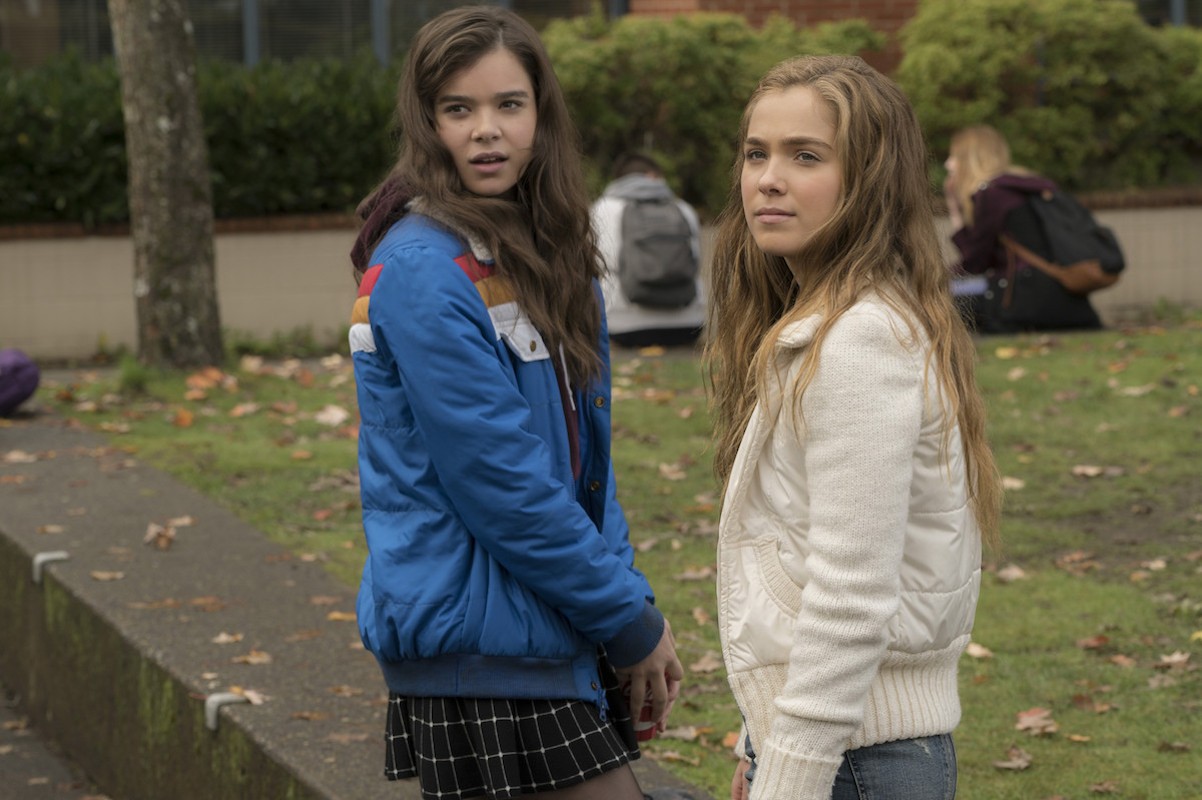Interview: Hailee Steinfeld, Blake Jenner + more of 'The Edge Of Seventeen' cast on their new film.
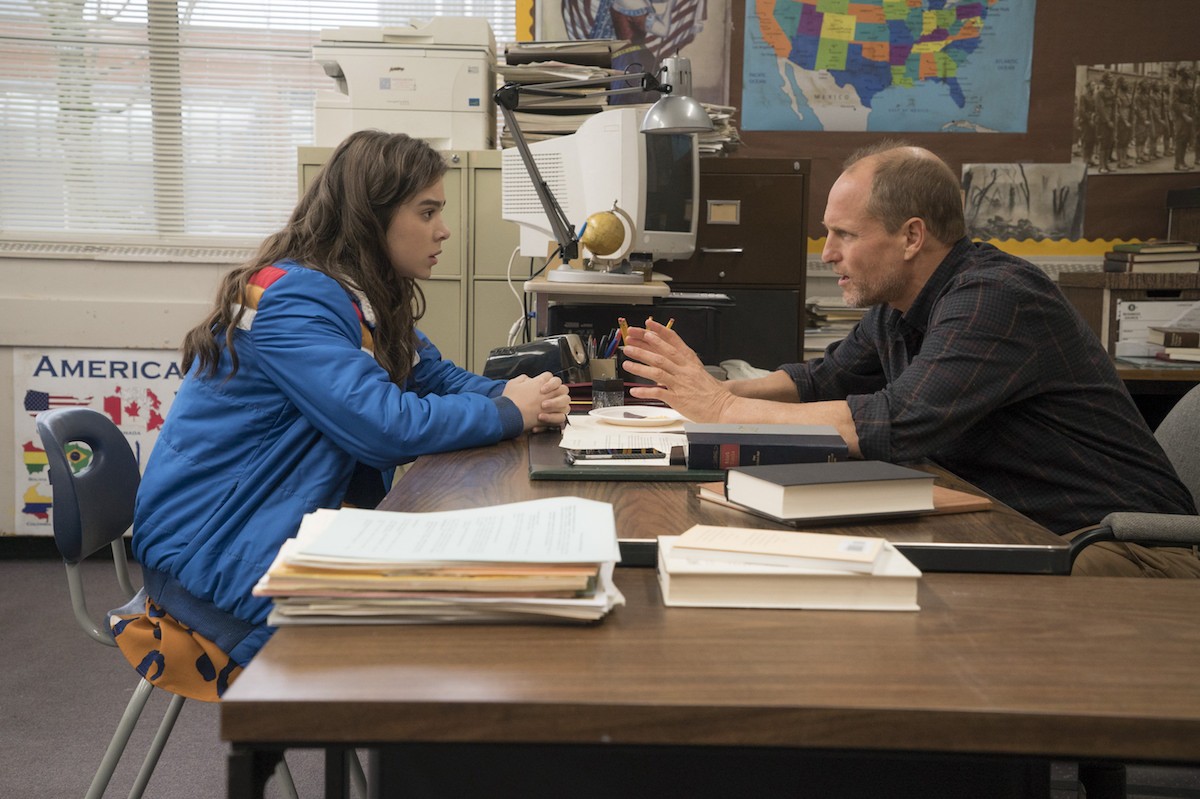
"I felt so connected to the core of the story because of how many characters that have something so relatable going on in their lives - the script was true to a teenager’s life in the 21st century," says Hailee Steinfeld about the relatability of her and Woody Harrelson’s new coming-of-age film, 'The Edge Of Seventeen'.
She further expands: "I personally have experienced so many of the things that Kelly [Fremon Craig] wrote for this character and her writing is so honest and raw. It was a weird vulnerable state going in there admitting to Kelly the similarities to what my friends and I have really experienced... I’m 18-years old, so I know almost everything in a teenager’s life is, in such a reasonable way, so blown out of proportion. Every little thing that happens is such a huge event. Everything that happens to Nadine means so much. Everything matters. Everything is so deeply felt.
Nadine is so smart, witty, quick, and feels everything. Most times when characters are hit with a curve ball, they try to cover it up or mask their emotions. But Nadine wears her feelings, her heart, and her everything on her sleeve. There’s something so refreshing about seeing someone that feels so much. She’s so desperate for any kind of human connection, it’s amazing to watch her seek that with anyone she possibly can."
Coup De Main recently sat down with 'The Edge Of Seventeen' cast-members - Hailee Steinfeld, Blake Jenner, Haley Lu Richardson, Kyra Sedgwick, Hayden Szeto - and the film’s director, Kelly Fremon Craig, to discuss the importance of not judging a book by its cover, being your own worst critic, and the burden of other people’s emotional baggage.
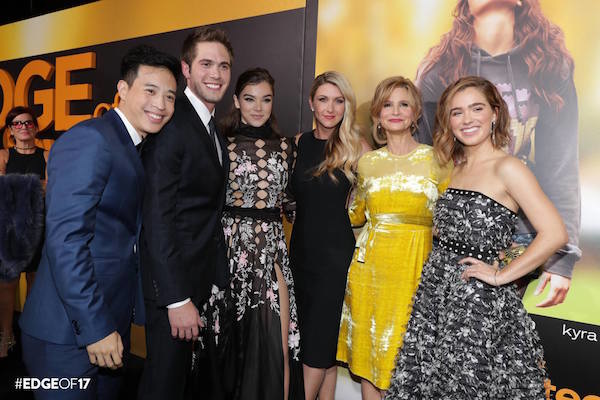
COUP DE MAIN: Blake, you were in Richard Linklater's amazing film, 'Everybody Wants Some!!', and now you’ve also done 'The Edge Of Seventeen'. How important do you think these iconic teen-films are to young people trying to make sense of the world and wanting reassurance that they’re not alone in feeling the way that they do?
BLAKE JENNER: So important; the most important! I come from a big family, and I’d be lying to you if I told you that I knew my brothers-- I’m still getting to know them and I’ve known them my whole life. I know some of my friends better, I know my dogs way more than I know my brothers. So I think these coming-of-age movies are a reminder that you’re not alone, and not just in a dramatic way, like 'Oh my god, I need someone to listen to me,' it’s just like perspective-wise, it all starts with you. You are watching this movie through Nadine’s eyes, or you’re looking at the experience through my eyes - but it’s okay, and live in the now, because life is so quick and these are the moments that are going to build who you are in ten years. I love these movies, I always have.
CDM: It’s rare to see such raw emotion portrayed in a teen-film nowadays. Do you think it’s important to present anxiety and social awkwardness in a very real and relatable way?
KELLY FREMON CRAIG: I think that is a real thing that I went through at that age, and I still go through it to a certain extent, the romanticising of people’s lives. It’s a terrible thing to do to yourself and it’s absolutely nowhere near the truth. Whatever snapshot people are giving is such a small fraction of the whole. I think particularly at that age, you don’t know, you actually think everyone has everything figured out and 'I’m the only one who is just a big giant mess.'
CDM: It’s so awesome that Kelly not only wrote the screenplay for 'The Edge Of Seventeen', but that this is also her directorial debut too. What was it like working with her on this film?
KYRA SEDGWICK: It was great, it was amazing, she had so much confidence, trust, and faith. She knew exactly what she wanted, and it’s always my favourite thing when they’re super specific.
BLAKE: And she was always down to talk, it was an open door policy. Sometimes you feel like you have to have it figured out when you arrive, but she was always down to figure anything out with you. With me, she was really cool, the second I got the part we had a talk on Skype and she gave me this exercise to do, this stream-of-consciousness exercise, and it got into Darian’s past with his Mom. It was about a month after his Dad passes away, and it was about a month after the Dad passes away, the first Soccer game, and he finishes the game and maybe his team wins. Then he looks at the stands to see his Dad and realises he isn’t there. Those were little secrets we kind of discovered together - she was so active, she cared about everything, and it was refreshing to be working for her. That was my experience; she was wonderful.
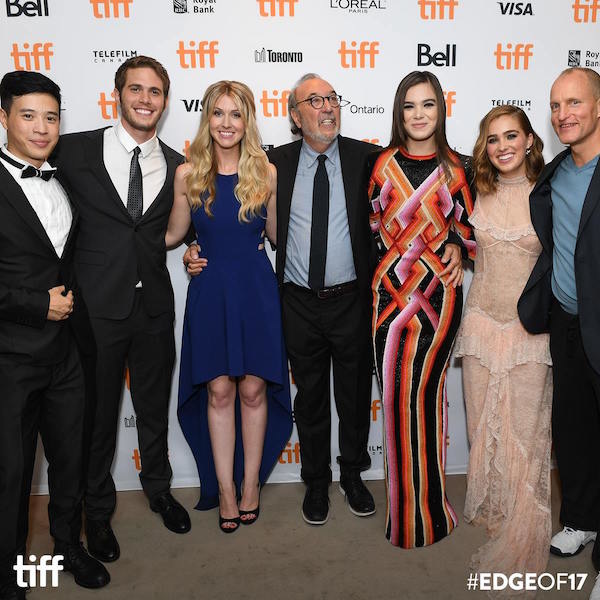
CDM: The classic idiom, 'That you can’t judge a book by its cover,' is a running theme all throughout the movie. Has society conditioned us all to be too judgemental of anyone that we don’t instantly relate to?
HAYDEN SZETO: For sure, I think a lot of good things in life are right in front of us, we are just addicted to drama. And I think that is a fault of media, it’s just something to do and something to talk about. People are all like, ’It’s like exercise, I just need drama,’ or else it’s not worth it. Things that are too easy are not attractive to me, and at the end of the day that is B.S. - what’s good is good, and if it’s hard to get and it’s making you uncomfortable, than it’s not for you.
HALEY LU RICHARDSON: I feel like another thing about that whole concept, is that if it comes from a place of ego or insecurity when you meet someone and you want to impress them or judge them or try to create a wall between you and them, if it comes from a place that isn’t from your heart, then it’s bad. I feel like society too, especially as an actor going into situations a lot, I feel like I have to like everyone and I feel like I have to put on my best behaviour and make people like me - but if I get a bad vibe from someone and it comes from a honest place in my heart, than that’s okay to not like people and it’s okay for people to not necessarily like you. And in the movie, she puts up all these walls not because she is doing it from her heart, she’s living through these mind-games that are insecurity and judgement and hate and resentment of things that happened to her, and her eyes are not open to new things.
CDM: Although it’s hard to step outside of yourself and look at your own flaws, do you think it’s important, sometimes, to be your own worst critic?
HALEY: I feel like totally yes-and-no about that. I think I’ve always been the most hard on myself. With dance - I did competitive dance - with school, and now with acting. No matter how much pressure I feel is coming from other people who are expecting me to do something or live up to something, at the end of the day it is me that keeps me up at night overthinking things and trying so hard. Which is important, but more self-motivation and self-love, as opposed to being your own worst critic. It can be so tough because it can be such a negative thing and you can get so caught up in it that you forget the joy and you forget what you love and you just close off. So I would say, a positive spin on that, that still keeps you working hard and having self-motivation and loving yourself, over being your own worst critic.
HAYDEN: For example, being an Asian-American actor, I think for the beginning of my career there was a constant chip on my shoulder as I thought I had a lot to prove. That is part of being your own worst critic, and when you have a chip on your shoulder it’s not attractive. It’s like you’re that guy at the bar who has something to prove to a girl, and girls are not attracted to that - it’s the same principle. If you have drive - I think that is a key word - if you’re driven, for example, I could look at it like, 'There are not many leading Asian-American men,’ and let that discourage me, or I could let that empower me and be like, 'I’m going to fill that gap.' Rather than, 'Nobody likes me, and no-one is going to invite me to any parties.' So it took me many years to tweak that point of view, and when it did it changed me. It changed me artistry, and how I approached my work. It’s all in your mindset.
KYRA: I never criticise myself, I always love myself, and that is the greatest thing ever. I think it is part of growing up and seeing what is working and not working. If you are constantly being victimised, then what are you doing to put yourself in that situation? If you’re always unhappy, why are you always unhappy? I think a part of growing up is maybe thinking, 'I have a part in this,' and that is the great thing about the character [Nadine], is that she has that moment where she is like, 'Sometimes I’ll look down at this person I am and just hate myself so much.' But she takes those little small steps, and she is sweet with her brother, or boyfriend, and thinking, 'I think that went well...' She is behaving differently and then seeing immediately the outcome is different.
CDM: Woody Harrelson’s character is like the Yoda of this film. Do you have someone in your own life like Mr. Bruner, that you look to for advice and guidance?
HALEY: I have so many of those and I feel like it’s so important when you recognise them and sometimes it could be someone your age. I feel like my dance teachers growing up, would be someone like that. It would be like therapy, I’d stay until midnight and just talk about everything, and they would be there as this outside perspective. When it’s your friends and everyone that is involved in it - sometimes even your parents - they care so much about you and they are biased in a way. To have someone at all stages in life who is separate to rely on and to connect to, I feel like it’s very important.
HAYDEN: I have one friend, his name is Charlie and we don’t hang out much, but whenever we do he really calls me out on my crap. You need honesty. I remember one time, I was going to go to dental hygiene school, because I wanted stability and all that. My friend didn’t even look at me, he was just playing video games, and he was like, "Why, why would you do that?" And I was like, "You know, it’s a pretty good income." And he was like, "Yeah, but if you don’t like it you’re going to get fired within a year." Then he was like, "So what do you want to do, Hayden?" It was a very simple conversation with zero eye contact, but it changed my life and he doesn’t even know that. So thanks, Charlie! But you need people like that and he gave me that.
HALEY: Sometimes you just need someone who is going to be real real, without any ulterior motives. My boyfriend is like that. He is real honest. He’ll watch me in something, and be like, "Uhhh, nah," but then it means so much.
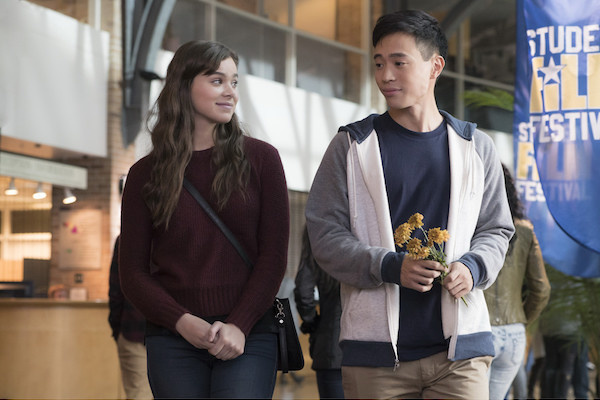
CDM: Nadine falls in lust/'love at first sight', and the situation swiftly escalates into rather aggressive messages to her crush, Nick. That she’s fallen in love with the idea of someone, rather than a real-life person she is actually familiar with. Similarly, the media and online fandoms romanticise celebrities and put them on pedestals for us all to feel an attraction and/or connection to. Which do you think is more dangerous? Crushing on a celebrity? Or crushing on an idealised dreamboat of someone who’s vaguely in your life but you’ve never even spoken to?
HALEY: Neither, I don’t think that is healthy.
HAYDEN: I am very strategic with the photos that I post on my Instagram. I’m all like, 'Man if you saw me two minutes ago you would not think that about me.' It’s a highlights reel.
HALEY: The whole idea of 'celebrity' is the stuff that is put out in the media when we are dressed up like this and hair/make-up like this. We don’t look like this... Beyoncé is amazing but she doesn’t look like that all the time. There are these really high expectations.
HAYDEN: She doesn’t wake up like that.
HALEY: She probably does wake up close to that though, because she is god.
CDM: The concept of a family used to be very straight-forward - a couple and their dependent children, i.e. a 'nuclear family'. But that’s not always the case in this day and age anymore, and 'The Edge Of Seventeen' really excellently portrays what happens when a child has to play the part of a 'parent'. In your opinion, where does one have to draw the line between unconditionally loving your family, and not being burdened with other people’s emotional baggage?
BLAKE: It’s a frustration that you can’t deny; it’s going to hit you. I think with him, at least with my experience, growing up I put a lot of pressure on myself, I graduated High School a year early and moved out to Los Angeles to pursue what I wanted to do, and I put all this pressure on myself not realising that one day you’re going to hit a wall. When you hit a wall you are all like, 'Whoah, whoah what’s that, what’s happening?' I just felt like I fast-forwarded everything. I feel like with Darian, he loves his Mother so much and he sees where she is hurting, I feel like he didn’t have time to emote and process his Father’s passing away because everyone else was feeling so hard and he was like, 'Okay well I’m the guy, I’m the man here,' and he had to be his definition of a man. I don’t think he was done learning from his father. He had to fast-forward himself mentally, so I don’t think he knows exactly what he is doing, and I think he is just trying to do his best. When he is at school he is probably thinking about his family, thinking about his Mom and what is going on with her, and when he is with his family he is kind of like, 'Oh man, I feel like I don’t even know what happened today, I don’t have time to be the kid.' It’s like you’re mentally playing ping-pong with yourself and trying to keep it the calmest game, tossing back and forward. I think he is doing his best; I don’t think he has to figure it all out.
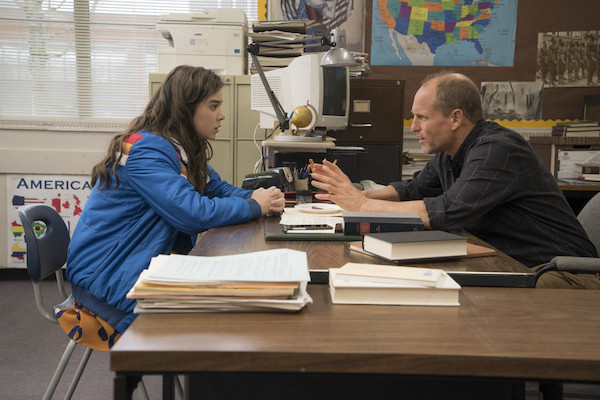
CDM: The film’s soundtrack is so good! But if you could add just one more song to it, what would it be?
KELLY: Oh god, that’s a good question... I’m completely blanking... 'She’s A Lady?' Hmmm no, couldn’t afford that. There is a Janis Joplin song, ‘Piece Of My Heart’, that I actually listened to on repeat while I was writing the script and I felt like it was very anthemic. I tried really hard to find a place for that song, but there was never a place. I love that there is just a ballsy, raw churning thing happening in that song, which Nadine/Hailee captured so beautifully.
CDM: Is the title of the film related at all to the Stevie Nicks song, 'Edge Of Seventeen'?
KELLY: Yes and no, she is such a strong gutsy female icon, and for that it felt right. But it’s also just about the feeling of being on the edge of your life - you’re on the pre-surface of something and have all those feelings of when you feel like you are passing from an old self to a new self.
CDM: Hailee, did you continue to work on music while filming?
HAILEE: Before I had the opportunity to really fully explore what making music really is-- it’s always been a part of my process and preparation, and we would exchange playlists - that I believe you guys had in mind roughly to as what the sound of the movie would be in that moment, which was amazing and it gave me perspective on like, 'This is where the audience is at this point.' And for me, I don’t think there’s ever a moment where I don’t have earphones in where I’m not listening to music while working on-set, but from my own project in music, I’ve become much more aware of the little things - if it’s something somebody says, or if it’s just a feeling, or a moment, or an idea, I’ll write it down and revisit it when I can fully focus on that and expand on it.
'The Edge Of Seventeen' is out in New Zealand cinemas now!
Watch the trailer below...

